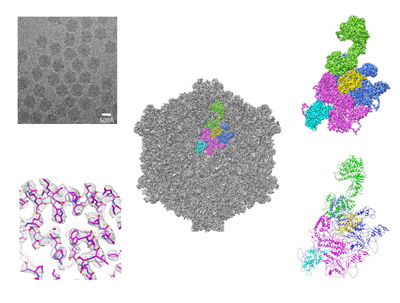On Jan. 10th, a research group led by Dr. Ping Zhu, a professor at the Institute of Biophysics (IBP), published work done in collaboration with other Chinese researchers in the Proceedings of the National Academy of Science, USA. The research article, entitled “Atomic model of a cypovirus built from cryo-EM structure provides insight into the mechanism of mRNA capping” by Cheng et al was published online ahead of print. Taking advantage of the state-of-the-art 300KV Titan Krios FEG transmission cryo electron microscope recently installed in the bio-imaging laboratory of IBP, the researchers reconstructed the 3D density map of a cypovirus (CPV) from Reoviridae at near-atomic resolution (3.9 ?) using cryoEM single particle analysis, and built the first full atomic model of this virus. Their study shows that there are five unique channels connecting the guanylyltransferase and methyltransferase regions in CPV’s pentameric turret, and reveals how the channels guide nascent mRNA sequentially to guanylyltransferase, 7-N-methyltransferase and 2’-O-methyltransferase in the turret, undergoing a highly coordinated mRNA capping activity. These findings provide significant insights into the mRNA capping mechanism of dsRNA viruses. The article presents the first reported atomic model of a macromolecule built from a cryo-EM structure in China. It also represents the first full atomic model (with amino acid side chains) built exclusively from CCD image data in the high resolution cryoEM area.
This research was conducted by Prof. Ping Zhu and Prof. Fei Sun’s groups from the National Laboratory of Biomacromolecules (IBP), Prof. Jingchen Sun’s group from South China Agricultural University, and Prof. Jingqiang Zhang from Sun Yat-sen University. During this collaborative research, Dr. Lingpeng Cheng from Prof. Zhu’s group took the cryoelectron microscopy (cryoEM) images and performed the 3D reconstruction, Dr. Xiaoxing Huang assisted with virus purification, Kai Zhang from Prof. Sun’s group assisted with atomic model building, and Dr. Gang Ji from IBP’s bio-imaging laboratory provided cryoEM technical support. This research was supported by the National Basic Research Program of China, and the National Natural Science Foundation of China.
Recently, there have been rapid developments in the 3D reconstruction and structural analysis of biomacromolecules and complexes by cryo-EM. Supported by the Chinese Academy of Sciences, IBP is building a state-of-the-art cryoEM research platform. In the past two years, IBP has built up a world-class bio-imaging laboratory with a powerful 300 kV Titan Krios FEG transmission electron microscope and other advanced peripheral cryoEM equipments. This study, along with cover featured study on Chaperon II structure[JF1] published in Structure by Prof. Fei Sun’s group in Oct 2010, shows that the establishment of the bio-imaging laboratory has significantly promoted cryoEM research in IBP. It also lays a solid foundation for cutting-edge cryoEM structural studies in the future. 
Figure legend: The upper left panel shows a cryo-EM image of CPV. The middle panel shows the overall 3D reconstruction of the CPV capsid. The segmented and colored part represents its basic asymmetric unit. The zoomed-in view and built atomic model of this asymmetric unit are shown in the upper right and bottom right panels respectively. The bottom left panel shows part of the VP1A proteins density map (mesh) superimposed on the atomic model. The side chains of amino acids are visible. |